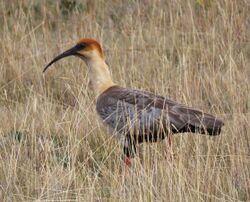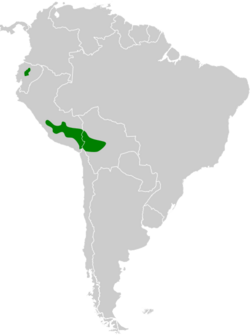Biology:Andean ibis
| Andean ibis | |
|---|---|

| |
| Scientific classification | |
| Kingdom: | Animalia |
| Phylum: | Chordata |
| Class: | Aves |
| Order: | Pelecaniformes |
| Family: | Threskiornithidae |
| Genus: | Theristicus |
| Species: | T. branickii
|
| Binomial name | |
| Theristicus branickii von Berlepsch & Stolzmann, 1894
| |

| |
| Synonyms | |
|
Theristicus melanopis branickii | |
The Andean ibis (Theristicus branickii) is a species of bird in the family Threskiornithidae. It is found in grassland and fields in western South America. This species was considered a subspecies of the black-faced ibis, and some taxonomic authorities (including the American Ornithological Society) still consider it so.
Description
It has a total length of approximately 75 centimetres (30 in). The head, neck and lower chest are buffish, the crown and nape are cinnamon, the upperparts and (often incomplete) chest-band are grey, the belly and flight feathers are black, and the wing-coverts are whitish (though not contrasting strongly with the grey upperparts). The bill, throat-wattle and bare skin around the eyes are blackish and the legs are red. The throat-wattle is smaller, the bill is shorter, the wing-coverts are greyer, the lower chest is paler and the cinnamon on the crown and nape is brighter and more extensive when compared to the black-faced ibis.
Distribution and status
The Andean ibis is restricted to altitudes of 3,000 to 5,000 metres (9,800 to 16,400 ft) in the Andean highlands of Bolivia, Perú and Ecuador. It is generally uncommon, and formerly also occurred in Lauca in far northern Chile .
References
- ↑ BirdLife International (2017). "Theristicus branickii". IUCN Red List of Threatened Species 2017: e.T22697444A112401898. doi:10.2305/IUCN.UK.2017-1.RLTS.T22697444A112401898.en. https://www.iucnredlist.org/species/22697444/112401898. Retrieved 19 November 2021.
- Matheu, E., & J. del Hoyo (1992). Family Threskiornithidae (Ibises and Spoonbills). pp. 472–506 in: del Hoyo, J., A. Elliott, & J. Sargatal (editors). Handbook of the Birds of the World. Vol. 1. Ostrich to Ducks. Lynx Edicions, Barcelona. ISBN 84-87334-10-5
Further reading
- Collar, N.J.; Bird, J.P. (2011). "Phenotypic discrimination of the Andean Ibis (Theristicus branickii)". Wilson Journal of Ornithology 123 (3): 459–463. doi:10.1676/10-162.1.
Wikidata ☰ Q2660392 entry
 |

